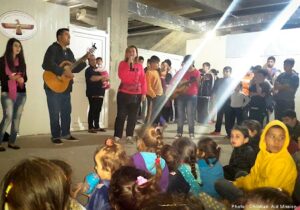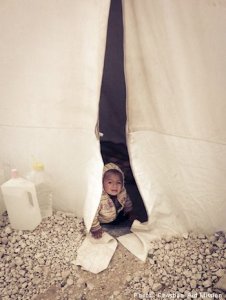
An ethnoreligious community in Iraq was once inaccessible to native Iraqi missionaries, as members lived reclusively in distant mountains near the border with Turkey. Since Islamic State (ISIS) atrocities drove them from their mountain strongholds last year, however, Yazidis now account for most of the people who have turned to Christ through a local ministry.
While ISIS terror tactics have contributed to many Muslims in Iraq and Syria coming to Christ, in the past six month about 70 percent of those displaced to the northern Iraqi cities of Erbil and Dohuk who have embraced Christ through one ministry’s outreach are Yazidis, a native Iraqi ministry director said.
“When they were kicked out of their area, they all went south to Dohuk and Erbil,” he said. “It was very far and very difficult for us to go there to reach these people, so the Lord just brought them to us.”
With beliefs and rituals rooted in Zoroastrianism, mixed with elements of Christianity and Islam, Yazidis dwelled in the high-altitude Sinjar Mountain range stretching from Iraq’s Nineveh Governorate to the lower, shorter segment in Syria. The Islamic State massacred as many as 500 Yazidis in an offensive last August in the Iraqi town of Sinjar and surrounding areas.
Among all displaced peoples the ministry has reached in the Erbil and Dohuk areas in the past six months, about 80 families have put their trust in Christ, he said. They are large families of seven to 10 people each. While more Muslims than Yazidis are coming to Christ among displaced people reached by other ministries, the director of this ministry (unnamed for security reasons) has seen Yazidis respond most. Among other converts, about 20 percent came from traditional churches where they had grown up with little knowledge of the Bible and had no relationship with Christ, and the remaining 10 percent came from Muslim families.
“Around Kurdistan there are so many churches and so many ministries, and I believe the number [of converts] is huge,” the director said, adding that the total likely amounted to several thousand.
Among them was a Yazidi boy of no more than 15, named Shirkahn, who lost both of his sisters to ISIS kidnappers. When the ministry director met him in Dohuk, the boy was trying to help his mother and father survive by asking people if he could shine their shoes for the equivalent of less than 25 cents.
“He told me this story with tears,” the director said. “His dad was paralyzed because of what happened to the family when ISIS kicked them out. Shirkahn told me that he hadn’t eaten for four days.”
Members of the ministry team prayed with him and asked if they could visit his family and pray for his father. He took them to their tent on the street.
“We talked to the mother; we talked to the father,” he said. “We prayed with them. We said Jesus can heal, and they immediately give their hearts to the Lord. And Shirkhan was very touched by this ministry, and he said, ‘How can I be a missionary like you and go help people? Shirkhan surrendered his life to the Lord and prayed with us.”

Those who come to Christ are connected to tent churches, while some who live close enough to an established church might walk to its building for worship. Thus people of varied backgrounds and ethnicities meet together for worship and instruction in Kurdish and Arabic, he said. Yazidis are primarily Kurdish-speaking.
“With the Yazadis, most of the women were taken,” he said. “So a lot of people went through hard times and are broken-hearted. We talked to them immediately.”
Displaced Muslims, meantime, continue to be open to the message of Christ—including, in one case, an apparent ISIS sympathizer or associate. A team from the ministry assisted by Christian Aid Mission was distributing aid and strayed into an ISIS area. They realized their error when an area man began asking them what they were doing there.
“He was very extremist, you could see by his beard,” the director said. “We said we were giving some help to these people. He said, ‘Yes, but I see your car has Bibles in it and Christian materials.’ We said, ‘Yeah, we work with a church and we give these away. But we will leave now if you want.’ He goes, ‘Why do you give all these people Bibles, and you don’t give one to me?’ So we were surprised that this guy was extremist and he asked us for the Bible. We gave him a Bible, and we started to tell him stories about the Lord, and then immediately we left the area.”
Please pray that more Yazidis and Muslims in the area come to know Jesus Christ as their savior. Also pray for the safety of Christian workers in the region.–Christian Aid Mission




Praise the Lord that some good news is coming out of all the horrors of the Islamic State! Jesus deliver all those people.
Comments are closed.